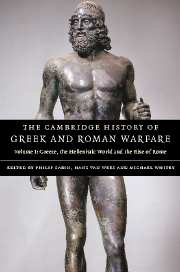Book contents
- Frontmatter
- Introduction: The Historiography of Ancient Warfare
- Part I Archaic and Classical Greece
- 4 International relations
- 5 Military forces
- 6 War
- 7 Battle
- 8 Warfare and the state
- 9 War and society
- Part II The Hellenistic World and the Roman Republic
- Chronological Table
- Glossary
- List of Ancient Authors
- Bibliography
- Index of ancient passages cited
- General index
- Map 1 The western Mediterranean
- Map 3 The Near East
- References
9 - War and society
from Part I - Archaic and Classical Greece
Published online by Cambridge University Press: 28 March 2008
- Frontmatter
- Introduction: The Historiography of Ancient Warfare
- Part I Archaic and Classical Greece
- 4 International relations
- 5 Military forces
- 6 War
- 7 Battle
- 8 Warfare and the state
- 9 War and society
- Part II The Hellenistic World and the Roman Republic
- Chronological Table
- Glossary
- List of Ancient Authors
- Bibliography
- Index of ancient passages cited
- General index
- Map 1 The western Mediterranean
- Map 3 The Near East
- References
Summary
War was a holiday for the Spartans, a relief from the rigours of military training to which they dedicated their lives, according to Plutarch (Lyc. 22.1–2). The Spartan reputation for discipline, professionalism and even militarism was – and is – second to none in the ancient world. But if the Spartans stood out, it was more because military standards in the rest of Greece were remarkably low than because their dedication was extreme in comparison with, say, a modern soldier’s. The other Greeks hardly engaged in any military training at all and showed no true dedication to warfare, as Xenophon was always keen to point out. For all the accounts and images of war in art and literature, for all the temples littered with dedications of booty and victory monuments, the impact of war on Greek society was rather limited. The demands of war usually did not dictate the daily routine of citizens, or shape social and political structures, or dominate economic activity. On the contrary, in archaic and classical Greece it was the demands of social, political and economic life which shaped warfare.
war and the leisure class
A defining feature of Greek society was the distinction between those who could afford to live off the labour of others – ‘the rich’ (plousioi) or leisured classes – and those who had to earn a livelihood – ‘the poor’ (penetes) or working classes. How best to spend one’s leisure was a much-debated moral issue from the seventh century onwards, with poets and philosophers warning against idle displays of luxury and increasingly urging that a man’s leisure should be spent actively participating in civic life, above all in politics and warfare.
Keywords
- Type
- Chapter
- Information
- The Cambridge History of Greek and Roman Warfare , pp. 273 - 300Publisher: Cambridge University PressPrint publication year: 2007
References
- 5
- Cited by

